Duties of a go-between

Dootikarma Prakarana

 f a woman has manifested her love or desire either by signs or by her body language, and is afterwards rarely or never seen anywhere, or if a woman is met for the first time, the man should get a clever friend to approach her.
f a woman has manifested her love or desire either by signs or by her body language, and is afterwards rarely or never seen anywhere, or if a woman is met for the first time, the man should get a clever friend to approach her.
Behavior of a Go-between
The friend, having wheedled herself into the woman's confidence, should try to make her despise her husband by her artful conversation, tell her about medicines for begetting children, talk to her about other people, recite tales of various kinds and stories about other men's wives; praise her beauty, wisdom, generosity and good nature, and then say to her: "It is indeed a pity that you, who are so excellent a woman in every way, should be possessed of a husband of this kind. Beautiful lady, he is not fit even to serve you". The go-between should also talk to the woman about the weakness of her husband's passion, his jealousy, roguery, ingratitude, aversion to enjoyment, dullness, meanness, and all his other faults that she may know of. She should particularly stress that fault or failing by which the wife appears to be the most affected. If the wife is a deer woman, and the husband a hare man, then there would be no fault; but if he is a hare man, and she a mare or elephant woman, then this fault should be pointed out to her.
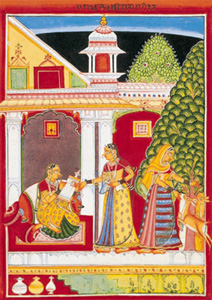
When the woman manifests her love, the go-between should increase it by bringing her love tokens from the man, by extolling his good qualities, and telling her stories about his love for her.
Gonikaputra believes that when it is the woman's first affair, or when her love has only been very secretly shown, the man should send a go-between with whom she may already be acquainted, and in whom she confides.
The go-between should tell the woman about the man's obedience and love, and as her confidence and affection increase, she should explain her mission to her thus: "Hear this, O beautiful lady, that this man, born of a good family, having seen you, has gone mad on your account. The poor young man has a tender nature, and is in such distress that it is highly probable that he will succumb to his present affliction, and experience the pains of death". If the woman listens with a favorable ear, and the go-between observes her good spirit in her face, eyes, and conversation, then on the following day she should again bring up the subject of the man, and tell her the stories of Ahalya and Indra, Shakuntala and Dushyanta, and other such appropriate tales. She should also describe to her the man's strength, his talents, his skill in the sixty-four arts mentioned by Babhravya, his good looks, and his liaison with some praiseworthy woman, even though this may not be true.
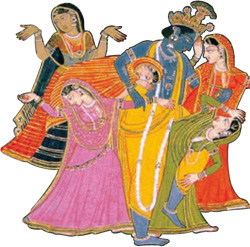
Taken over by desire, cowgirls swirl and swoon around Krishna.
Behavior of the Woman with the Go-between
In addition, the go-between should carefully note the behavior of the woman. If it is favorable, she should address her with a smiling look, seat herself close beside her and ask, "Where have you been? What have you been doing? Where did you dine? Where did you sleep? Where have you been sitting?" The woman too should meet the go-between in secluded places and tell her stories there, yawn contemplatively, draw long sighs, give her presents, remember her on festivals, dismiss her with a wish to see her again, and say to her jestingly, "Oh, well-speaking woman, why do you speak these bad words to me?" She should discourse on the sin of her union with the man, not tell her about any previous visits or conversations with him, but wish to be asked about them, and lastly, should laugh at the man's desire, but not reproach him in any way.

If the husband is a hare man, and the wife a mare or elephant woman, then this fault should be pointed out to her by the go-between sent by the willing lover.
Carrying Love Tokens
When the woman manifests her love in the manner described above, the go-between should increase it by bringing her love tokens from the man. But if the woman is not personally acquainted with the man, the go-between should win her over by extolling his good qualities, and telling her stories about his love for her. Auddalaka says that when a man and woman are not acquainted with each other, and have not shown each other any signs of affection, the employment of a go-between is not of much use. Babhravya, on the other hand, affirms that even though they are personally unacquainted, but have shown each other signs of affection, there is an occasion for the employment of a go-between. Gonikaputra asserts that a go-between should be employed if they are acquainted, even though no signs of affection may have passed between them. Vatsyayana maintains that even though they are not personally acquainted, and may not have shown each other any signs of affection, still they are both capable of placing confidence in a go-between.
The go-between should show the woman the betel nut and betel leaves, the perfumes, flowers, rings and other presents which the man may have given for her, and on which should be impressed the marks of the man's teeth and nails, and other signs. On the cloth that he sends he should illustrate with saffron both his hands joined together as if in earnest entreaty.
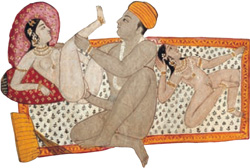
A go-between can raise enmity between any two lovers if she wishes to do so, or extol the loveliness of any woman that she wishes to praise. She can also speak highly of a man's skill in sexual enjoyment, and of the desire of other women, more beautiful even than the woman he is addressing.

Women of cities and towns generally visit the apartments of the royal ladies, as they are acquainted with them, and spend the night in conversation, sports and amusements. On such occasions a female attendant of the king, previously acquainted with the woman whom the king desires, should loiter about, and accost her when she sets out to go home, and lead her to the king.
The go-between should also show the woman ornamental figures of various kinds cut in leaves, ear ornaments, and chaplet made of flowers containing love letters expressing the man's desire, and persuade her to send affectionate presents to the man in return. After they have mutually accepted each other's presents, then a meeting should be arranged between them on the faith of the go-between.
Suitable Meeting Places
The followers of Babhravya say that this meeting should take place at the temple, or at fairs, garden parties, theatrical performances, marriages, sacrifices, festivals, when going to the river to bathe, or at times of natural calamities, fear of robbers or hostile invasions. Gonikaputra is of the opinion, however, that these meetings are better arranged in the abodes of female friends, mendicants, astrologers, and ascetics. But Vatsyayana asserts that the only place well suited for the purpose is one which has proper means of ingress and egress, and where arrangements have been made to prevent any accidental occurrence, and when a man who has once entered the house can also leave it without any disagreeable encounter.
Different Kinds of Female Messengers
The go-betweens or female messengers are of the following kinds: A woman who, having observed the mutual passion of a man and woman, and brings them together with the power of her own intellect, is called a go-between who takes upon herself the whole burden. This kind of go-between is chiefly employed when the man and the woman are already acquainted with each other, and have conversed together, and in such cases she is sent not only by the man, as is always done in all other cases, but by the woman too. This name is also given to a go-between who, perceiving that the man and the woman are suited to each other, tries to bring about a union between them, even though they are not acquainted with each other.

A person who, perceiving that the affair has already begun, or that the man has already made advances, and completes the rest of the business, is called a go-between with limited powers.
A go-between who simply carries messages between a man and a woman, who love each other, but who cannot frequently meet, is said to be a letter bearer. This name is also given to one who is sent by either of the lovers to acquaint the other with the time and place of their meeting.
A woman who goes herself to a man, and tells him of her having enjoyed sexual union with him in a dream, expresses her anger at his wife having rebuked him for calling her by the name of her rival, gives him a token with the marks of her teeth and nails, informs him that she knew she was formerly desired by him, and asks him privately whether she or his wife is better looking, is a go-between for herself. Such a woman should be met and interviewed by the man privately and secretly.
This name is also given to a woman who, agreeing to act as a go-between for some other woman, wins over the man to herself, and thus causes the other woman to fail. The same applies to a man who, acting as a go-between for another, and having no previous connection with the woman, wins her for himself, thus causing the failure of the other man.
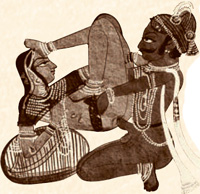
By folding her legs upwards the nayika allows her lover an entry from below.
A woman who gains the confidence of an innocent young wife, learns her secrets without coercion, finds out about her husband's behavior, and then teaches her the art of securing his favor by adorning herself to show her love, instructing her how and when to be angry, or pretending to be so, and then, having herself made marks of the nails and teeth on the wife's body, gets her to send for her husband to show these marks to him and excite him, is known as the go-between of an innocent young woman. In such cases the man should send replies to his wife through the same woman.
When a man gets his wife to gain the confidence of a woman whom he wants to enjoy, and to call on her and talk to her about his wisdom and ability, she is termed a wife serving as a go-between. In this case the feelings of the woman with regard to the man should also be made known through the wife.
If a man sends a girl or a female servant to a woman under some pretext, and places a letter in her bouquet of flowers, or in her ear ornaments, or marks something about her with his teeth or nails, that messenger is called a mute go-between. In this case the man should expect an answer from the woman through her.

The nayaka enters the palace disguising himself as a guard and engages his beloved who is one of the women of the king’s harem. Even though he knows the secret entrance to the harem, he should enter only if he safely knows his way out.
A person who carries a message with a double meaning, to a woman, or one which relates to some past transactions, or is unintelligible to other people, is said to be a go-between adept in the art of secret codes. In this case the reply should be obtained through the same person.
There are some shlokas on the subject:
A female astrologer, servant, beggar, and a female artist are well acquainted with the business of a go-between, and very soon gain the confidence of other women. Any one of them can raise enmity between any two persons if she wishes to do so, or extol the loveliness of any woman that she wishes to praise, or describe the arts practiced by other women in sexual union. They can also speak highly of the love of a man, or his skill in sexual enjoyment, and of the desire of other women, more beautiful even than the woman they are addressing, for him, and explain the restraint under which he may be at home.
Lastly a go-between can, by the artfulness of her conversation, unite a woman with a man, even though he may not have been thought of by her, or may have been considered beyond her aspirations. She can also bring back a man to a woman, who, owing to some cause or other, has separated himself from her.
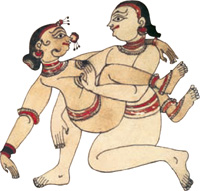
The nayika swings in her lover's arms as he plays with both her nipples.